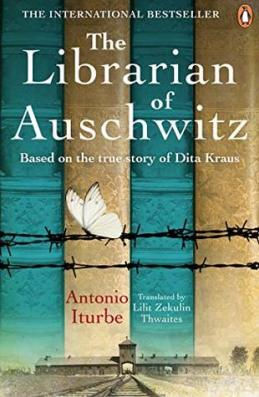'The Librarian of Auschwitz' by Antonio Iturbe
- audreylinton

- Feb 1, 2020
- 3 min read
The Librarian of Auschwitz is based on the true story of Dita Kraus, a fourteen-year-old girl imprisoned in Auschwitz-Birkenau concentration camp. As she adjusts to the horrors of camp life, Jewish leader Freddy Hirsh asks Dita to become the camp librarian and take charge of the eight books the prisoners managed to save and sneak past the guards. Dita risks her life for these books and provides the children of Block 31 with an escape from the death and destruction surrounding them. It reminds us of the power a good book can have. Dita’s story is one of hope and courage, and one that must be shared.

A few days ago, on the 27th January, was Holocaust Memorial Day and 75 years since the liberation of Auschwitz. There's no better way to keep the memory of the Holocaust and the story of its victims alive than a book like The Librarian of Auschwitz. As someone who spent their last year at university specialising in the Holocaust, I have to admit that I was a tad bit sceptical about these types of books, which are based on true events but are told in a more story-like narrative. However, I really enjoyed The Librarian of Auschwitz; Dita is an incredibly brave girl from Prague who had to face the horrors of ghetto and concentration camp life. As death and despair surround all those living in Block 31 in Auschwitz-Birkenau, Dita becomes the librarian of the secret teaching block, and her camp life begins to revolve around safeguarding these books from the eyes of the Nazi guards, notably the infamous Nazi doctor Josef Mengele.
The novel sheds light on the horrors of living in a concentration camp but also shows the different types of camps which existed. Block 31 was a family camp, which raised a lot of questions from both the prisoners and Nazi officials. What was the purpose of maintaining a family camp if the Nazi goal was to exterminate all Jews? It seems as though the Nazis were conducting some sort of experiment with the family block, but we never seem to find out what (and that’s something I’m definitely going to look into). I think Antonio Iturbe successfully shows the complexity of the ‘Final Solution’ and the Nazi’s plan.
The Librarian of Auschwitz also shows the different relationships throughout camp, notably between the guards and prisoners. At first, I was a bit nervous that the relationships between the SS and prisoners were going to be over-romanticised, but Antonio Iturbe shows the fear of Jewish women when they were approached by ‘friendly’ guards – Dita’s friend Rennee is pursued by an SS member, and she begins to fear for her life. Plus, other inmates of the camp begin to spread rumours about Rennee as they are jealous of her ‘special’ treatment from the guard. Camp life is clearly far more difficult than any of us could ever imagine, and it’s not made any easier by continuous competitiveness and jealousy from your own camp-mates.
The narration of the book, however, can sometimes be a little confusing. Antonio Iturbe occasionally shifts perspectives a little unexpectedly and can jump back and forth from life before the camp to the present day. However, the scenes of extermination and persecution were really well written and were really moving, especially as they were backed by statistics and facts on what actually happened. We’re reminded that these events did actually happen, as difficult as it might be to perceive the inhumanity of the Nazis.
Overall, I think this is an eye-opening story for people who know less about the events of the Holocaust, and it is told in a compelling and moving way. I’m glad I’ve read Dita’s story and the courage she showed at just fourteen years-old. I would recommend this book for fans of Anne Frank’s Diary and The Tattooist of Auschwitz.
Favourite quotes:
“A bullet in Auschwitz is more valuable than a human being.”
“Starting a book is like boarding a train to go on holiday.”
“In a place like Auschwitz where everything is designed to make you cry, a smile is an act of defiance.”
“Peace doesn’t cure everything, at least not that quickly.”



Comments